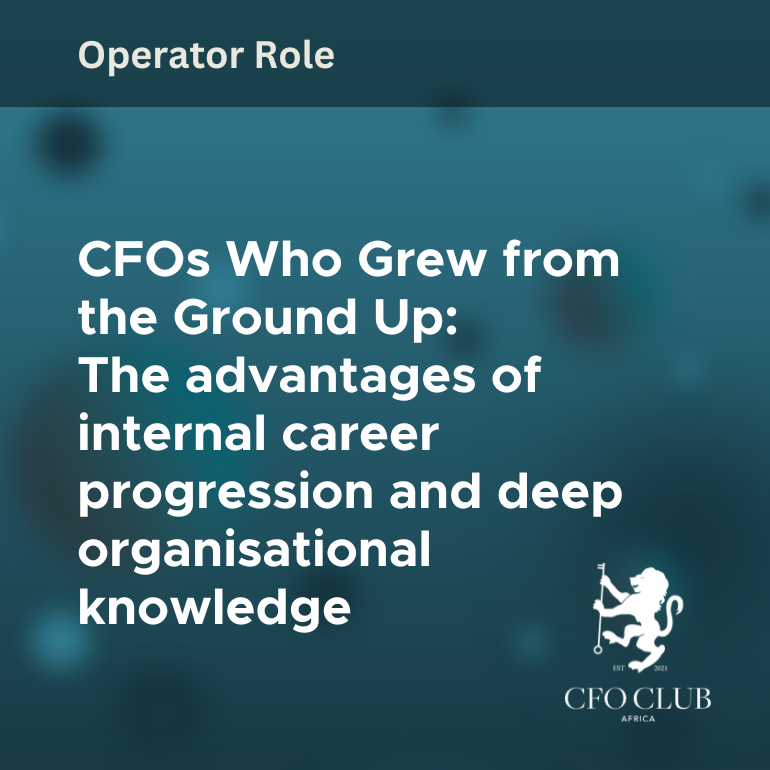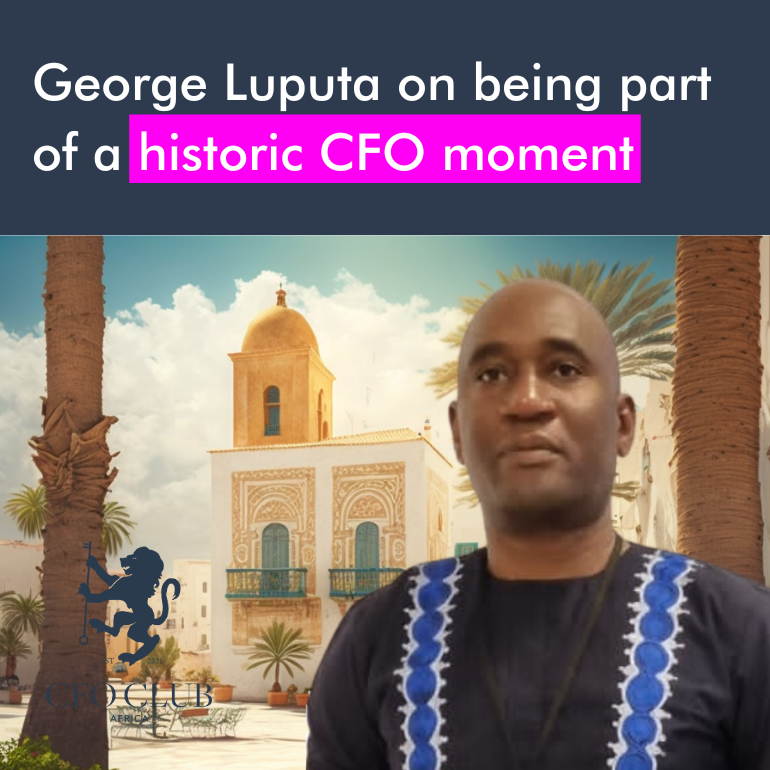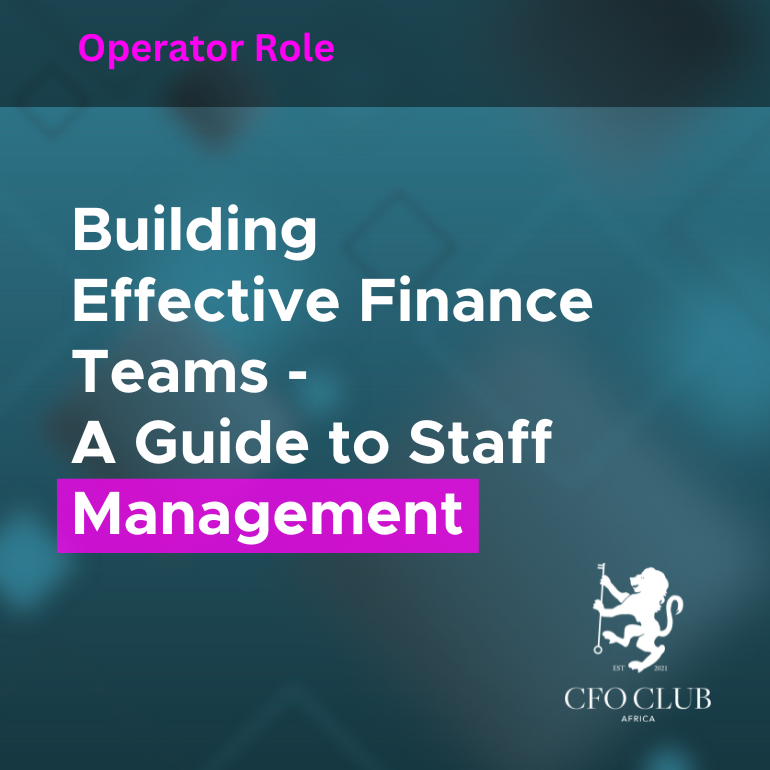CFOs Who Grew from the Ground Up:
The advantages of internal career progression and deep organisational knowledge
In boardrooms across South Africa, many CFOs carry impressive titles and equally impressive qualifications. But ask a few how they arrived at the seat they now occupy, and you will notice two clear paths. Some joined the company already holding the CFO title. Others started somewhere entirely different, perhaps as junior accountants, financial analysts, or even in unrelated operational roles, and worked their way up through the ranks.
This second group is a breed worth paying attention to. CFOs who grew from the ground up have something their externally-hired counterparts often lack. They have deep, lived-in organisational knowledge that cannot be replicated in a handover file or a three-month induction programme. Despite the clear advantages, internal progression is not always the first choice for boards seeking a new CFO. Sometimes they believe they need fresh eyes or external expertise. That thinking is not wrong, but it is not always right either.
It is worth unpacking why home-grown CFOs can bring a unique and powerful edge to the role, where the pitfalls lie, and how both CFOs and boards can maximise the benefits of this career path.
Institutional Memory: The Power of Knowing the Backstory
A CFO who has been part of the organisation for years understands its history. This is not only the official version in strategy documents but also the real, lived history. They know why a particular system was chosen, which acquisitions worked and which did not, and how a certain long-standing client was saved from walking away at the last minute.
This knowledge has practical benefits.
- It supports better decision-making because you understand the “why” behind past actions.
- It helps you avoid repeated mistakes because you have personally seen what failed.
- It speeds up execution because you already know the right people to involve.
In a South African context, where companies often navigate complex regulatory environments, volatile market conditions, and diverse stakeholder expectations, this kind of insight is not a luxury. It is a strategic advantage.
Trust That Money Cannot Buy
Climbing the ranks builds credibility in ways no CV bullet point can. Colleagues have seen you deliver under pressure, keep your promises, and handle crises without losing your composure. That trust can smooth over board disagreements, secure buy-in for unpopular cost-saving measures, and make collaboration with operations, HR, and sales much easier.
This is particularly important in South African organisations, where relationships and networks play a major role in execution. A CFO who already knows the informal communication channels, the decision-makers behind the scenes, and the unspoken company culture can get things done faster and with less resistance.
The Risk of Comfort Zones
Not every internally-promoted CFO thrives. Sometimes deep familiarity can lead to complacency. You may know the way things have always been done so well that you stop challenging it.
This is one of the biggest criticisms boards have when bypassing internal candidates for an external hire. They fear that internal leaders will simply maintain the status quo. Without a conscious effort to stay curious and think like an outsider, even the most talented internally-grown CFO can become trapped in a narrow way of thinking.
The solution is to actively seek fresh perspectives. Network with peers outside your organisation. Benchmark against competitors. Attend industry events. And most importantly, keep asking, “Why do we do it this way?”
Cross-Functional Insight That External Hires Lack
Many CFOs who grew from the ground up have not spent their entire careers in finance. They may have rotated through operations, compliance, IT, or even sales. That broad exposure means they understand the business as a system and not just as a set of numbers.
In practice, this results in:
- More realistic budgets because you understand operational constraints.
- Better risk management because you can see where operational and financial risks overlap.
- Stronger strategy input because you know how each department contributes to value creation.
Given the multi-disciplinary demands placed on modern South African CFOs, from ESG compliance to digital transformation, this breadth of perspective is a real asset.
The Loyalty Factor: Friend or Foe?
Long service often comes with deep loyalty to the organisation. This is usually positive. You care about the company’s future, not just your own career. However, loyalty can sometimes turn into reluctance to make hard calls. This is especially true when those decisions affect colleagues you have worked alongside for years.
CFOs need to recognise this risk. Your duty is to the long-term financial health of the business, not to protecting everyone from discomfort. It is a difficult balance to strike, but the best CFOs manage it by focusing on transparency and fairness, even when the news is hard to deliver.
Proving Your Readiness for the Top Job
For those still climbing the ladder internally, the biggest challenge is often visibility. People may see you as head of finance material but not necessarily as CFO material. Breaking through that perception requires intentional effort.
Practical steps to stand out include:
- Volunteering for cross-departmental projects to show you can operate beyond finance.
- Building a track record of strategic wins that tie directly to company growth.
- Mentoring and developing other leaders to prove you can lead leaders, not just teams.
- Communicating like a board member by being concise, commercial, and focused on outcomes.
Boards: How to Make the Most of Internal CFO Talent
If you are on a board considering an internal promotion, here is how to set your CFO up for success:
- Pair them with an external mentor to help them avoid insular thinking.
- Invest in executive coaching to sharpen leadership and communication skills.
- Support ongoing professional development to keep them current with industry trends.
- Encourage healthy dissent so they feel safe to challenge entrenched ideas.
This approach maximises the benefits of their deep organisational knowledge while also reducing the risks of complacency.
The Bottom Line
In a country where business continuity is often tested by economic swings, policy changes, and infrastructure challenges, CFOs who have grown from the ground up offer something rare. They bring stability anchored in real organisational experience. This advantage only delivers if it is combined with a willingness to adapt, learn, and challenge the familiar.
The best internally-promoted CFOs bring the loyalty of a long-time insider and the curiosity of a newcomer. That combination can be a game-changer for South African businesses if both the CFO and the board commit to nurturing it.
If you are a CFO who has risen through the ranks, take pride in your history, but do not let it limit your future. If you are a board member, do not overlook the talent already in your building. The next great leader for your business might already have your company’s Wi-Fi password.





